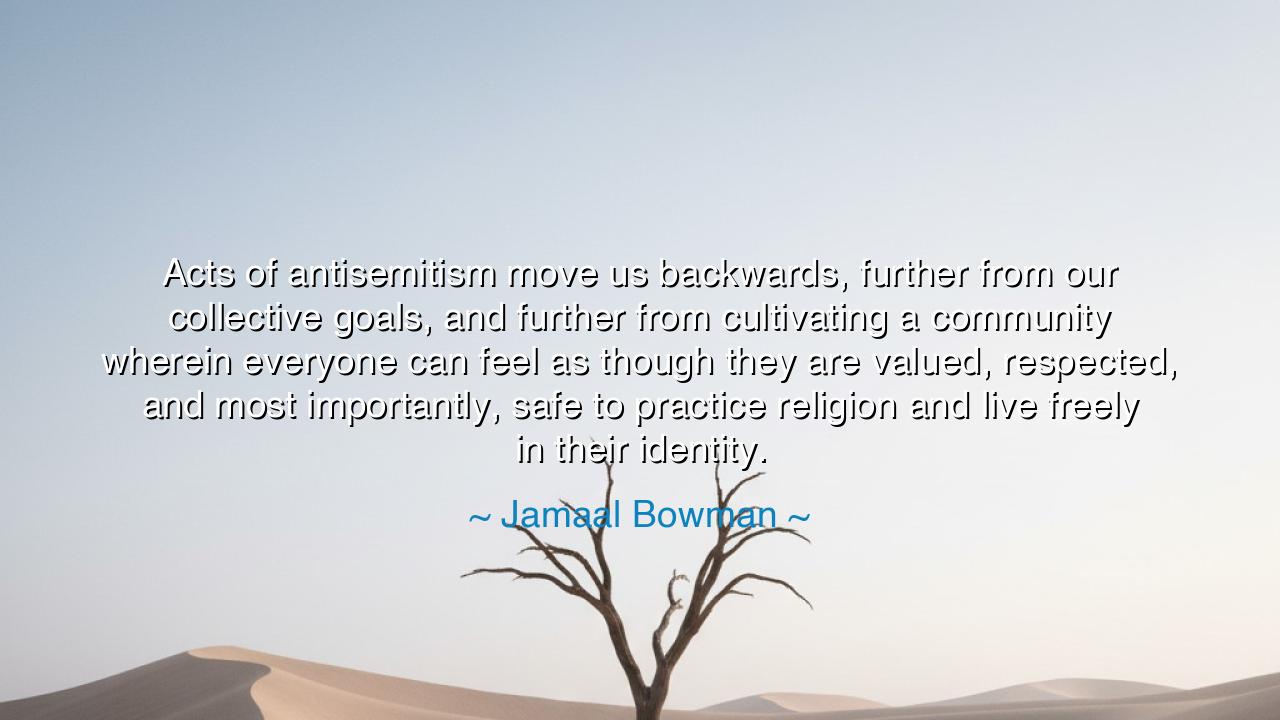
Acts of antisemitism move us backwards, further from our
Acts of antisemitism move us backwards, further from our collective goals, and further from cultivating a community wherein everyone can feel as though they are valued, respected, and most importantly, safe to practice religion and live freely in their identity.






Jamaal Bowman, speaking with the urgency of a guardian of justice, declared: “Acts of antisemitism move us backwards, further from our collective goals, and further from cultivating a community wherein everyone can feel as though they are valued, respected, and most importantly, safe to practice religion and live freely in their identity.” In these words, he names the wound that hatred inflicts—not only upon its victims, but upon the very soul of society. For every act of antisemitism, every deed of prejudice, is not progress but regression; it unravels the bonds of unity, driving humanity away from its higher destiny of peace and mutual dignity.
The ancients knew this truth well. They taught that a city divided against itself cannot endure. When Athens exiled its own thinkers, it weakened the very foundation of its wisdom. When Rome persecuted minorities, it planted seeds of unrest that corroded its unity. Hatred, exclusion, and violence do not strengthen a people; they move us backwards, away from the flourishing that only harmony can bring. Bowman echoes this timeless wisdom: the progress of society is measured not only by wealth or power, but by whether each person feels valued, respected, and safe.
History offers a stark reminder in the horrors of the Holocaust. Millions of Jews were stripped of dignity, identity, and life itself. The nations that allowed such hatred to fester fell into barbarism, betraying not only their victims but their own humanity. Out of that abyss, the world cried “Never Again.” And yet, acts of antisemitism still rise, reminding us that vigilance is eternal. Bowman's words are a modern echo of this lesson: that whenever hatred returns, it pulls us back toward darkness, away from the light of collective goals such as justice, freedom, and peace.
But his statement is not only a lament—it is a call to responsibility. For every community, every generation, must labor to cultivate spaces where all people may live freely in their identity. This is no easy task. It requires courage to stand against prejudice, wisdom to heal divisions, and compassion to lift up those who are marginalized. Yet without this labor, there can be no true unity. To ignore or excuse acts of hatred is to let the garden of society become overrun with weeds. Only deliberate care—respect, safety, and dignity for all—can keep the soil fertile for peace.
Consider the life of Martin Luther King Jr., who proclaimed that injustice anywhere is a threat to justice everywhere. He understood, as Bowman declares, that hatred against one group harms the whole. To tolerate antisemitism is not only to wound Jews; it is to wound the dream of humanity itself, the dream of a community in which every person can live without fear. King marched not for one people alone but for the vision of all people walking together into the light of freedom.
The meaning of Bowman’s words, then, is deeply motivational. They remind us that hatred is not neutral—it drags us backwards. Respect is not optional—it is the foundation of progress. Safety is not a luxury—it is the birthright of every person. To allow antisemitism, or any prejudice, to spread is to deny our collective goals, to sabotage the very future we hope to build.
The lesson is clear: if we desire a better world, we must stand actively against all forms of hatred. Cultivate community. Value every person. Respect every identity. Protect every religion’s right to practice freely. Progress is not measured only by inventions or conquests, but by the creation of societies where the weak are safe, the marginalized are honored, and the different are embraced.
Practical actions follow. Speak out when you witness prejudice. Educate yourself and others about the history of antisemitism and other hatreds. Build friendships across boundaries of faith and culture. Support policies and leaders who protect freedom of religion and identity. And above all, let your daily actions—your words, your choices, your presence—be seeds of respect and dignity. For only then can we move forward together, and not backwards into the shadows of history.
O seeker, carry Bowman’s wisdom: hatred moves us backwards, but respect moves us forward. Choose each day to cultivate community, to protect the dignity of others, and to build a world where all may live freely. For in this lies not only the safety of the present, but the hope of the future.






AAdministratorAdministrator
Welcome, honored guests. Please leave a comment, we will respond soon